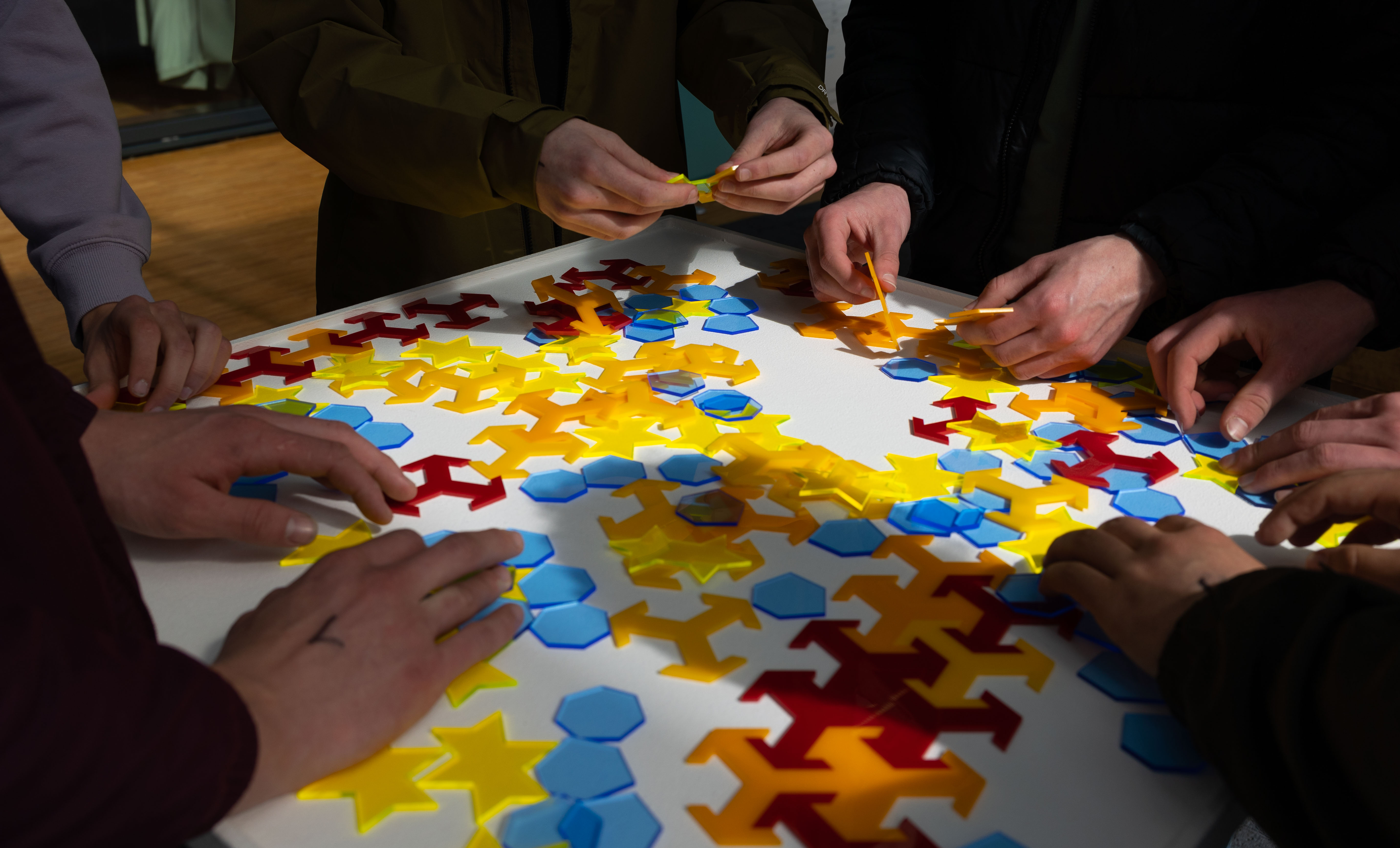Scholieren bezoeken IMAGINARY
De tijdelijke expositie IMAGINARY, over de schoonheid van de wiskunde, is in de maand april te zien in de Bernoulliborg en de Energy Academy. Op dinsdag 4 april kwamen zo’n honderd vwo4-leerlingen van verschillende middelbare scholen uit Noord-Nederland naar de Zernike campus, waar ze in de ochtend twee gastcolleges kregen over Sterrenkunde en Scheikunde. Na de lunch gingen ze in kleinere groepen actief aan de s lag met workshops en kregen ze van een student assistent een rondleiding langs de interactieve IMAGINARY tentoonstelling.
Het deel in de Bernoulliborg bestaat uit wiskundige posters, interactieve schermen en uitdagende puzzels. De interactieve onderdelen trekken de meeste aandacht van de scholieren. Op een touchscreen spelen twee jongens een spel waarbij ze met bootjes de oceaanbodem in kaart brengen. Door samen te werken vinden ze de schat op het diepste punt van de zee. ‘Goed gespeeld’, zeggen de jongens terwijl ze elkaar de hand schudden.
"We weten niet meer precies hoe we het deden, maar we konden het hiervoor in 29 keer."
Een van de wiskundige puzzels “De Toren van Ionah” heeft als doel om vijf schijven van verschillende groottes te verplaatsen op basis van twee regels: Je mag maar één schijf tegelijk verplaatsen en een grotere schijf mag niet op een kleinere schijf terechtkomen. De scholieren vertellen dat ze in maar 29 stappen de puzzel opgelost hebben. Volgens het bijschrift kunnen alleen echte kampioenen de opdracht in slechts 31 bewegingen uitvoeren, dus 29 is een knappe prestatie. Ze proberen het nog eens voor de verslaggever. Het begin van hun strategie weten ze nog maar bij de middelste schijven kraken hun hersenen bijna hoorbaar. ‘Moest deze nou hier bovenop?’ zegt een jongen. Ze lopen vast, en na een aantal pogingen geven ze op. ‘We weten niet meer precies hoe we het deden, maar we konden het hiervoor in 29 keer.’

"Je moet wel echt goed opletten en niet per ongeluk iets anders doen."

Na een kwartier loopt de groep naar het andere deel van de IMAGINARY tentoonstelling, in de Energy Academy. Leerlingen bekijken geïnteresseerd de wiskundige 3D vormen en ontwerpen hun eigen algebraïsche oppervlakken met een interactieve app. Aan picknicktafels werken de scholieren in groepjes aan cryptografische opdrachten. Geconcentreerd ontcijferen ze een van de geheimschriften – een zogenaamde varkenshok versleuteling. Ze vinden de oplossing: “Frikandelbroodje een plus een gratis”. Een meisje merkt op: ‘Je moet wel echt goed opletten en niet per ongeluk iets anders doen.’
Tjaarda vond het Sterrenkunde gastcollege interessant, maar was graag nog wat dieper ingegaan op het materiaal. ‘Het college ging vooral over dingen die ik al wist.’, zegt ze. De scholiere komt uit Friesland en ze denkt erover om in Groningen te studeren. 'Rechten vind ik interessant, want dat heeft mijn moeder ook gestudeerd', vertelt ze. Ook psychologie en geneeskunde behoren tot haar opties.

Vliegtuigjes vouwen
Als afsluiter krijgen de leerlingen een workshop papieren vliegtuigjes vouwen door hoogleraar en ingenieur Roel Luppes. Hij demonstreert de Wet van Bernoulli – vernoemd naar de beroemde Groninger geleerde – met behulp van een blanco A4'tje. ‘Ik blaas eroverheen, en zoals je ziet gaat het papiertje omhoog. Hoe kan dat?’, vraagt Luppes zich hardop af. De wet van Bernoulli verklaart dat de snelheid van de luchtstroom boven het papiertje hoger is dan de snelheid onder het papiertje, waardoor de druk boven het papiertje lager is dan onder het papiertje. Dat veroorzaakt een verschil in druk, waardoor het papiertje omhoog gaat. Luppes vraagt de zaal: ‘Heb je weleens gehad dat je in de douche staat, en het douchegordijn plakt aan je vast? Dat wordt ook verklaard door de wet van Bernoulli doordat er een snellere luchtstroom tussen jou en het douchegordijn is dan aan de achterkant van het gordijn.’ Luppes vertelt verder hoe deze wet gebruikt wordt in de aerodynamica bij het bouwen van een vliegtuig.

Noodlanding
Na de uitleg gaan de leerlingen enthousiast aan de slag met het vouwen en mogen ze van bovenaan de trap hun vliegtuigjes de collegezaal in gooien. ‘Dat gaan we eens even proberen’, zegt een jongen. Hij gooit zijn eerste ontwerp de zaal in, de vlucht is van korte duur en het vliegtuigje duikt vrij snel richting de grond. Zijn tweede vliegtuigje blijft zo’n vijf seconden in de lucht en legt aardig wat meters af. ‘Waarom is die tweede nu beter?’, vraagt Luppes de leerling. De jongen antwoordt: ‘Door het vleugeloppervlak, dat is groter.’ Eén vliegtuigje maakt een noodlanding tegen het plafond en belandt klem tegen de lamp – die blijft daar nog wel even hangen.

De IMAGINARY tentoonstelling is georganiseerd door Platform Wiskunde Nederland in samenwerking met Nederlandse universiteiten en ondersteund door partnerorganisaties, en trekt door Nederland heen. De Groningse editie is mede mogelijk gemaakt door Science LinX, het science center van de Faculty of Science & Engineering. Kijk voor meer informatie op de IMAGINARY website.
Tekst: Myrna Kooij
Beeld: Leoni von Ristok
